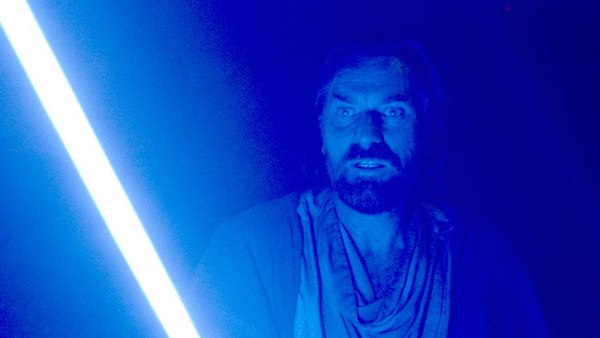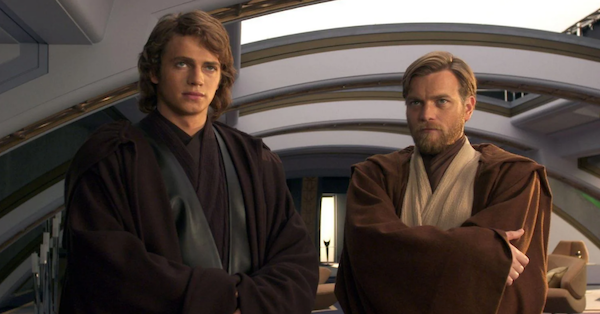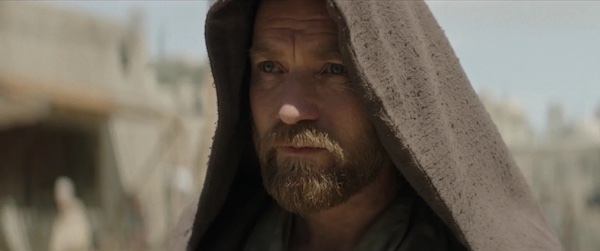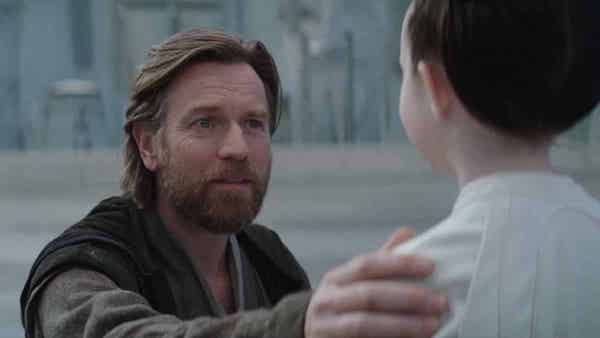This article contains spoilers for the TV mini-series Obi-Wan Kenobi, streaming on Disney+
In Episode One of Obi-Wan Kenobi, the Empire uses an interesting method to track and overcome the runaway Jedi, Obi-Wan. They play on what they believe makes him vulnerable: his goodness. As the Inquisitors, tasked with hunting down the last surviving Jedi, discuss how to best detect an escaped Jedi, the Grand Inquisitor states ominously: “compassion leaves a trail.”
“Surely goodness and mercy shall follow me all the days of my life…” Psalm 23:6
The compassion of the Jedi does leave a trail. Their goodness is palpable. Obi-Wan, despite practically cutting himself off from the Force through guilt and anxiety, is no different. He continues to act with generosity and kindness, and it leaves him vulnerable. In the eyes of the Empire’s Inquisitors, this makes him weak. While their goal is to dominate, manipulate, and conquer the entire galaxy, Obi-Wan's goal is to accompany, understand, and defend the defenseless. That, the Inquisitors feel, puts him at a disadvantage. He is the hunted, not the hunter. He is on defense, not offense. He is susceptible to being affected by the sufferings of others.

Ewan McGregor as Obi-Wan Kenobi in "Obi-Wan Kenobi." © 2022 Disney+. All Rights Reserved.
This understanding of goodness as weakness is explicitly stated in Episode Six. In a flashback, we see the young padawan learner, Anakin, before his fall to the Dark Side, practicing dueling with his master Obi-Wan. As the practice duel progresses, Anakin gets increasingly aggressive to the point that he might actually wound his teacher. Obi-Wan warns him: “You grow too aggressive, Anakin. Be mindful. A Jedi’s goal is to defend life, not take it.” Anakin replies: "Mercy doesn’t defeat an enemy, Master. Which is why you’re gonna lose."
“For I desire mercy, not sacrifice, and acknowledgement of God rather than burnt offerings.” Hosea 6:6
Anakin understands the Jedi’s mercy as weakness. In his mind, mercy doesn’t allow for domination, because it doesn’t have the brute strength to destroy and conquer. In the flashback, we see that Obi-Wan is not a perfect teacher. As in the prequel films, we see him struggle with worry and doubt as he works with young Anakin. Even with his faults, Obi-Wan continues to lovingly remind Anakin of mercy’s quiet, hidden strength to disarm and win over.

Hayden Christensen and Ewan McGregor in "Star Wars: Episode III - Revenge of the Sith." © 2005 20th Century Fox. All Rights Reserved.
If we honestly examine our own reactions to suffering or conflict, we may often fall into a more Anakin-like mentality than we would care to admit. It is so easy to strike back hard when we are hit, and to enact harsh justice for the sake of fairness and efficacy. Politically, this can come in the form of things like the death penalty, where justice is based on the transactional fairness of life for life rather than witnessing to the possibility of redemption. Societally, we often see accusatory or dismissive comments on social media, where the snarkiest or most forceful wins the day, shutting down opportunities for dialogue and communion. Personally, it can come in the form of needing to have the last word in an argument, feeling that one wins by the audible power of the last word rather than by truth or charity.
Redemption, communion, truth, and charity all have one and the same source: our crucified Lord. He was seen as weak. He was believed to have lost. Yet, he uncovered the quiet, hidden strength of goodness in disarming and winning over the hearts of hardened enemies. Christ's victory, won through the vulnerability that came with goodness and love, changed all our lives. It redeemed us.

Ewan McGregor in "Obi-Wan Kenobi." © 2022 Disney+. All Rights Reserved.
Obi-Wan’s goodness transforms many people throughout the Obi-Wan Kenobi series. He gains the loyalty of smugglers, the trust of little Leia, and the forgiveness of Uncle Owen. But the greatest victory of his goodness was the mercy he showed in sparing Darth Vader’s life at the end of their brutal duel. It was a mercy that deeply angered Darth Vader, but it sowed the seeds of Vader’s own journey of redemption, seen in the original trilogy films. From that duel with Obi-Wan, Vader would go on to kill many people, including Obi-Wan himself. From a worldly perspective, it might seem that Obi-Wan’s mercy was weakness which resulted in his own downfall. But we know from the original trilogy, especially Return of the Jedi, that ultimately the fruit of that mercy was not death, but redemption.
And as our own Savior has shown us, redemption is the greatest triumph of goodness and love.
“There are different kinds of gifts…but the greatest of these is love.” 1 Cor. 12:4, 13:13
Obi-Wan Kenobi is a beloved character to every generation of Star Wars fans. He shows his flaws but he is a good man. Even as he struggles with his own anxieties, self-criticism, and inner turmoil, he shows through his compassion, uprightness, and mercy that goodness is not weakness. It is strength.
Have you seen the Obi-Wan Kenobi series? If so, try one or both of these prayer experiences:
- Read 1 Corinthians chapters 12 and 13 where Paul lays out all the gifts we might have and defines the gift of love. Then rewatch the last scene of Episode Four of Obi-Wan Kenobi, where Leia and Obi-Wan hold hands in the escape ship. What verse of 1 Cor. 12 or 1 Cor. 13 does this scene highlight for you? What do you find most moving or challenging about that verse? Have you left a trail of compassion in your life? If not yet, how is the Lord inviting you begin?
- Read Psalm 23. Then rewatch the scene in Episode Six of Obi-Wan Kenobi that of Obi-Wan’s final battle with Anakin/Darth Vader. What verse of Psalm 23 does the scene highlight for you? What do you find most moving or most challenging about that verse? How can you live out mercy in your life with the people around you, as you lean on the Lord’s own loving mercy for you?

Ewan McGregor as Obi-Wan and Vivien Lyra Blair as Leia in "Obi-Wan Kenobi." © 2022 Disney. All Rights Reserved.